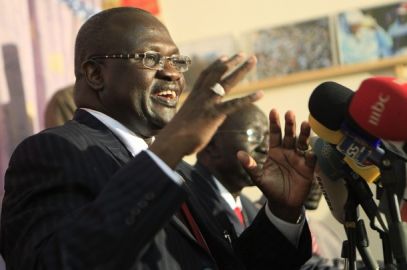S. Sudan’s VP urges investigations into allegations of human rights abuse
August 6, 2012 (JUBA) – South Sudan’s Vice-President, Riek Machar on
Monday admitted the poor conditions in the country’s prisons, but said
his country will strive towards addressing all cases of human rights
abuses allegedly committed by law enforcement agencies.
 The US-based Human Rights Watch (HRW), in its reports on the state of
The US-based Human Rights Watch (HRW), in its reports on the state of
prison in South Sudan, details a series of human rights violations,
specifically citing arbitrary arrests, illegal detention, and denial
of bail, inhumane mistreatment of inmates, among others as some of the
abuses in prisons.
The research, conducted between March 2011 and January 2012, also
points fingers at law enforcement officers of unlawfully arresting
some of the culprits, in complete defiance of the Code of Criminal
Procedures Act, 2008.
Machar, while speaking at the launch of the HRW report in Juba, the
South Sudan capital, described the report as very “comprehensive”,
saying South Sudan inherited numerous challenges when it got
independence in July last year.
“The report carried out by African Human Rights Watch is a challenging
report, which exposes the challenges in South Sudan’s justice
systems,” said the Vice-President.
South Sudan, he said, has been running two parallel systems; the
statutory and the customary legal systems, but said the deficiencies
in the latter is too great, thus requires immediate redress.
However, to strengthen the country’s justice systems, Machar eluded
that South Sudan in in the process of establishing a human rights
forum, with support from the international community, to address the
loopholes within existing institutions.
Earlier on, South Sudan’s interior minister, Alison Magaya, also
admitted that the poor state of the country’s prisons, most of whom he
said, were constructed to accommodate less than 1000 inmates, yet now
handles over 6,000.
Juba Central Prison, for instance, which was constructed to house just
400 inmates, now reportedly caters for over 1,000 of them.
The minister, however, said his ministry has embarked on a strategic
plan for reforms, focusing on programmes involving restructuring and
capacity building of law enforcement officers in the country.
Albeit he cited financial constraints as a major setback to his
ministry, Magaya reiterated the strong will and commitment of the
government towards improving the poor conditions of prisons in the
country.
Meanwhile, Daniel Bekele, HRW Executive Director for Africa Division,
said South Sudan, which faces numerous complex challenges should view
institutional building, especially the rule of law as a pillar in its
nation-building processes.
“Administration of justice is very crucial in the implementation of
the rule of law in South Sudan,” Bekele said, while lauding the
government of South Sudan for taking the rule of law programme as one
its principle priorities.
He also urged the country’s leadership to take immediate steps to
ratify all the regional and international human rights laws and
regulations, as part of its commitment to improve human rights
situations in the country.
The 105-page report, also recommends that the National Legislative
Assembly amends the Code of Criminal Procedures, to require that
suspects appear before a judge within 24 hours of arrest; that South
Sudan Human Rights Commission (SSHRC) also investigates all these
cases of abuse and hold those found guilty accountable, among others.
(ST)
